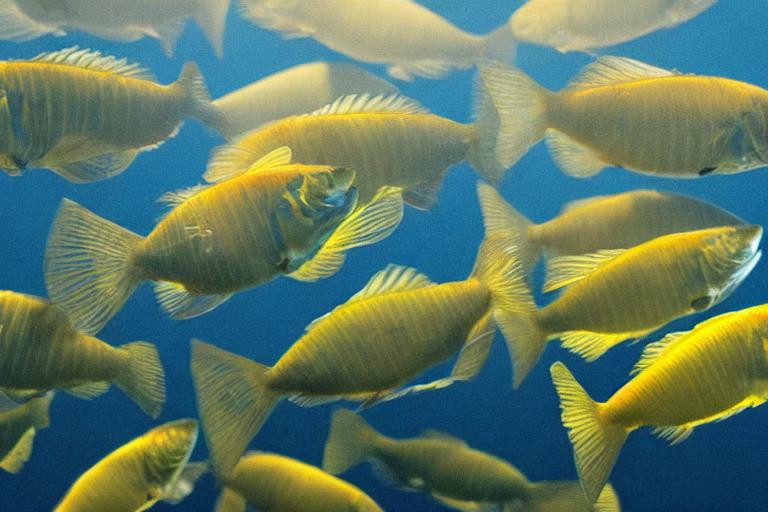It’s no secret that fish are often found in dark, murky waters. But why do they prefer these conditions? It turns out that there are several reasons for this behavior. For one, fish are less likely to be seen by predators in dark waters. Additionally, the darkness can provide a sense of safety and security for fish. Additionally, dark waters tend to be more oxygen-rich, which is essential for fish health. Finally, the darkness can also help fish to avoid bright light, which can be harmful to their eyes.
How Do Fish React in the Dark?
While fish are not able to see in complete darkness, they are able to see in dimmer light than most other animals. One of these adaptations is their ability to see in the dark. Fish are interesting creatures that have many adaptations for living in the water.
Their eyes are large and have a reflective layer that helps them gather light. Fish have several adaptations that help them see in the dark. In addition, many fish have a light-sensitive organ called the pineal gland that helps them see in low-light conditions.
Fish also have a special way of processing light that helps them see in the dark. Their eyes are able to detect both blue and green light, which allows them to see in murky water.
In addition, their ability to process blue and green light allows them to see in murky water. Their large eyes and reflective layers help them gather light, and their pineal gland helps them see in dim light. While fish are not able to see in complete darkness, they are able to see better than most other animals in low-light conditions.

How Many Hours of Darkness Do Fish Need?
This is because darkness triggers the release of hormones in fish that are essential for their health and well-being. Most fish need at least 10 hours of darkness each day.
Darkness also helps fish to avoid predators and to find food. Many fish are nocturnal, meaning they are most active at night.
However, most fish do best in an environment that includes a regular period of darkness. Some fish, such as goldfish, can adapt to a wide range of light conditions.
What Happens if You Leave a Fish in the Dark?
The fish may also become more active, which can lead to it bumping into things and injuring itself. If you leave a fish in the dark, it may become stressed and may not be able to see its food.
Why Shouldn’t You Use Sunlight for Your Fish?
The sun can cause the water in your tank to overheat, and this can lead to health problems for your fish. Additionally, the sun can cause the plants in your tank to grow too quickly, which can make it difficult for your fish to swim and breathe. While it may seem like a good idea to use sunlight to help heat up your fish tank, it can actually be harmful to your fish.
Using Artificial Light
In fact, many fish species are found in both salt and freshwater. Fish are often thought of as creatures of the sea, but they actually spend a great deal of time in freshwater environments.
In the wild, fish are exposed to a wide range of light levels, from the bright sunlit surface to the dark depths of the ocean. One of the most important factors in a fish’s environment is the amount of light.
In captivity, however, fish are often kept in tanks that are lit by artificial light. This can be a problem for fish, as they are not used to such high levels of light.
In addition, artificial light can cause problems with a fish’s vision, and can even lead to blindness. Artificial light can cause stress in fish, and can also interfere with their natural sleep patterns.
If you keep fish in an aquarium, it is important to provide them with a light source that is as close to natural light as possible. This will help to keep your fish healthy and happy.
Do Fish Sleep Better in the Dark?
However, there are some fish that do prefer to sleep in the dark. In fact, fish are constantly on the lookout for predators, so they need to be able to see at all times. It’s a common misconception that fish sleep in the dark.
Fish that sleep in the dark typically do so because they’re trying to avoid predators. By hiding in the shadows, they’re less likely to be seen by predators that are looking for an easy meal.
Fish are Cold-blooded animals, so they need to be in water that’s the same temperature as their body in order to stay healthy. Some fish also prefer to sleep in the dark because it helps them to regulate their body temperature.
If the water they’re in is too warm, they can get sick or even die. By sleeping in the dark, they can stay in cooler water and avoid getting sick.
By doing so, they’re able to avoid predators and regulate their body temperature. So, while all fish need to be able to see at all times, some fish do prefer to sleep in the dark.
How Do You Know if Your Fish Is Sleeping?
When it comes to sleep, fish are very different from humans. For one, they don’t have eyelids, so they can’t close their eyes. They can sleep for short periods of time, or they can go for long periods without sleeping at all. Fish also don’t have a regular sleep cycle like we do.
Another way to tell if your fish is sleeping is to observe their behavior. If they are not swimming around or interacting with their tank mates, it’s likely they are taking a nap. One way is to look at their fins. So, how can you tell if your fish is sleeping? When fish are asleep, their fins will be relaxed and they may even stop moving altogether.
Sleep is important for all animals, including fish, and it helps them stay healthy and active. If you’re wondering why your fish sleeps, it’s likely for the same reasons we do – to rest and rejuvenate.
Sources
Some sources, such as scientific studies, can provide direct evidence that can be used to support the claim that fish do indeed like the dark. Other sources, such as personal anecdotes or observations, can provide indirect evidence that can be used to support the claim. There are many different types of sources that can be used to answer the question of whether or not fish like the dark.
One scientific study that provides direct evidence that fish like the dark was conducted by researchers at the University of South Florida. The study found that when fish were placed in a dark environment, they exhibited significantly less stress than when they were placed in a well-lit environment. The study also found that fish in the dark environment were more likely to engage in social behaviors, such as swimming in groups, than fish in the well-lit environment.
For example, many people who keep fish as pets have noticed that their fish seem to be more active and playful at night, when the lights are off, than during the day. Personal anecdotes and observations can also provide indirect evidence that fish like the dark. This is likely because the fish feel more comfortable and relaxed in the dark.
The dark environment seems to reduce stress levels in fish and encourage them to engage in social behaviors. Overall, the evidence from both scientific studies and personal observations suggests that fish do indeed like the dark.
Frequently Asked Questions
1. Do fish like the dark?
No, fish do not like the dark. In fact, they are afraid of the dark.
2. Why are fish afraid of the dark?
Fish are afraid of the dark because they cannot see in the dark. This makes them easy prey for predators.
3. What happens to fish when they are in the dark?
Fish become very stressed when they are in the dark. Their heart rate increases and they may even stop eating.
4. Is it bad for fish to be in the dark?
Yes, it is bad for fish to be in the dark. It can cause them to become sick or even die.
5. How can I make sure my fish are not in the dark?
Make sure to keep your fish tank in a well-lit room. You can also use a night light to keep the tank illuminated at night.
Final thoughts
Overall, it seems that fish do prefer darker environments and benefit from them in a number of ways. If you’re looking to create a healthy and stress-free environment for your fish, consider dimming the lights or providing them with hiding spots.
